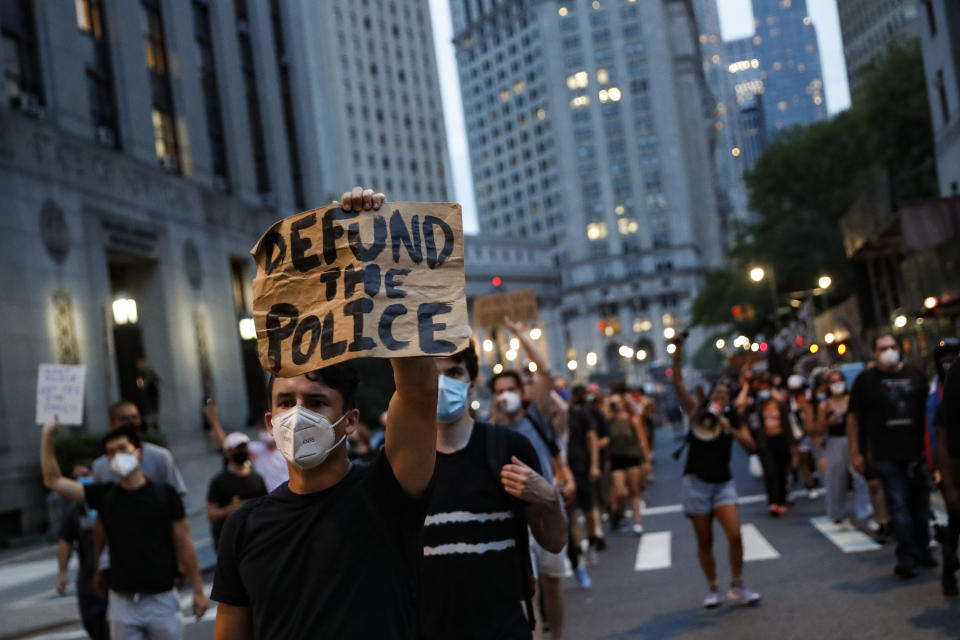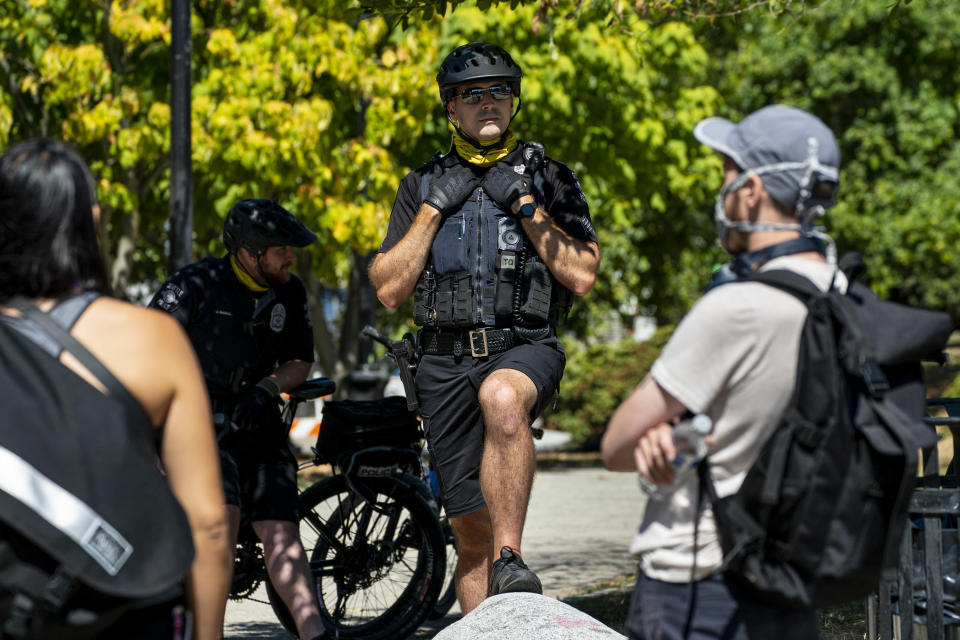Cities move cautiously on defunding the police — satisfying neither side
The death of George Floyd and the ensuing “Defund the police” rallying cry led to ambitious proposals in cities to rethink the role that police departments serve in communities and how governments should allocate funds for the services police provide, especially those that are not directly related to law enforcement, such as dealing with homeless or mentally ill civilians.
The resulting changes, though, have been disappointing for some defunding proponents who want bolder steps toward reducing police budgets, and alarming for others who worry about the fallout of such cuts — and fear that it will ultimately diminish the police presence in communities most vulnerable to violent crime.
This summer, city officials began tackling the issue. New York City is moving forward with $1 billion in cuts to the NYPD for the next fiscal year. The City Council in Los Angeles approved a $150 million reduction to the LAPD’s budget. Last week, the Austin, Texas, City Council adopted a budget that will reduce the police department’s funding by about $20 million.
A national poll conducted in June on Black Lives Matter and police reform indicates there’s generally more opposition than support for measures to defund the police, although the data science firm CIVIS notes in an analysis of the poll that the term itself may influence people’s reactions.
Voters who haven’t been following the issue might interpret “defund” as equivalent to “abolish.”
“‘Defund the police’ means reallocate,” Rashawn Ray, a sociologist with the Brookings Institution, told Yahoo News. “There are places that are starting to consider it, but there are places that have already done it. Take Prince George’s County [Md.]. They [redirected] $20 million from a police training center to a mental health center. That’s reallocation. Baltimore did something similar with [$22] million. That’s reallocation.”

Some measures, even relatively modest ones, to reallocate funding from police to other services and agencies have created friction among elected leaders.
In Seattle, the City Council weighed an $85 million cut in the 2020 budget for the city’s police department, which operates on an overall budget of roughly $400 million.
The council rejected the plan, opting to instead trim about $4 million off the department’s budget this year — according to City Council members — which will result in layoffs and pay cuts for top SPD officers, including Police Chief Carmen Best, the first Black woman to lead the department.
Best announced her resignation the next day.
The cuts freed up funds to invest in community-led public safety organizations, according to Council President M. Lorena González. But a press conference after the vote with Best and Mayor Jenny Durkan, who had been at odds with the council over budgetary matters, indicated that budget talks caused strife among councilors and the mayor and SPD officials.
“This is not about the money,” Best said. “Targeting my command staff and their pay, it just felt very vindictive and very punitive, and I don’t want them to be affected by that type of animus.’’
Best’s resignation prompted a statement from U.S. Attorney General William Barr that he was “disheartened” to learn about her stepping down.
“In the face of mob violence, she drew the line in the sand and said, ‘Enough!’” Barr said, “working tirelessly to save lives, protect her officers and restore stability to Seattle. This experience should be a lesson to state and local leaders about the real costs of irresponsible proposals to defund the police.”

Councilor Kshama Sawant, who proposed the $85 million cut and pushed for reductions in SPD commanders’ six-figure salaries, was the only person who voted against the budget on Aug. 10 because it didn’t cut enough, according to a statement she released after the vote.
Ahead of the vote, Sawant, the lone socialist on the Democratic-controlled council, told Yahoo News that, after “grand promises for a couple of weeks,” she was not surprised to see members settle on a much smaller cut. Sawant had sought to slash half the SPD budget by looking at the money the police department would have left over from a $409 million budget between August and December — $170 million. Half of that is $85 million.
“Why is it that Democratic establishments in various cities, whether it’s Seattle or New York, felt the pressure to actually make such bold promises? Let alone the fact that they didn’t live up to those promises. Making such bold promises in the first place is not what the Democratic establishment does,” Sawant told Yahoo News. “It reflects a serious pressure they felt from the rebellion in the streets.”
In New York, for example, Sawant said, it’s significant that “the movement has won at least $1 billion in cuts.” But, she added, “it needs to be seen, it needs to be tested out over time — because a lot of the on-the-ground critics are pointing out that at least some, if not all, of those billion dollars are accounting shifts that are not going to result in major changes.”
The cuts in New York City led to concerns in some Black and brown communities about underpolicing, according to the New York Times, which reported this month that some Black City Council members oppose deep cuts to the NYPD.
“Look at what they did in New York City,” former NYPD Officer Eugene O’Donnell told Yahoo News. “The City Council didn’t say, ‘Let’s look for efficiency. Let’s make [the NYPD] more effective.’ They blindly said, ‘We want to take a billion dollars away.’”
O’Donnell said vulnerable New York communities that tend to see higher rates of crime will be affected by cuts to police. “You can virtue-signal all you want,” said O’Donnell, who teaches at the John Jay College of Criminal Justice. “You can say you’re doing something great. But actually the decisions that are being made [have] a profound impact on poor people.”

But Ray said that defunding the police doesn’t necessarily mean there will be fewer officers in neighborhoods. And more police, he said, doesn’t always mean less crime.
The national CIVIS poll reported that a higher number of Black Americans reported a strong distrust of police than said they trust the police. White respondents held the opposite view.
“Police have a horrible response time in a lot of those neighborhoods anyway,” Ray said. “Even in places with higher levels of crime, police officers aren’t that responsive. And I think that’s part of people’s point [when they say that] more police does not mean more safety for us, particularly for Black communities.”
In Los Angeles, some residents were unimpressed with the $150 million budget cut, according to public comments made at virtual City Council meetings in June. “Defund the police; $150 million is a laughable attempt,” one person said. “Listen to the people and adopt the people’s budget of Los Angeles.”
Defunding the police remains a politically charged topic, with the Trump administration commenting often on the issue. This month, White House press secretary Kayleigh McEnany falsely linked the movement to spiking crime rates in New York City, Los Angeles and Minneapolis, where officials are studying a proposal to disband the existing police department, even though the cities’ measures are too new to have a measurable impact on crime. Trump often attacks what he describes as the liberal leadership in these cities.
“They want to end cash bail, close prisons, defund police departments, or at least largely defund,” Trump told reporters last week. “You see that with New York, a billion dollars they took out of that police department and crime has gone through the roof.”
Could such measures ultimately cause crime to rise? It depends on what the measures mean, said Richard Rosenfeld, a criminologist at the University of Missouri-St. Louis.
“If it means abolishing the police department, yes, that will put upward pressure on crime rates,” Rosenfeld said. “If defunding means reducing the budget for the police, but shifting those funds to other agencies that would then take over some of the functions once performed by the police, no, I don’t think that’s going to have a big impact on crime.”
_____
Read more from Yahoo News:


